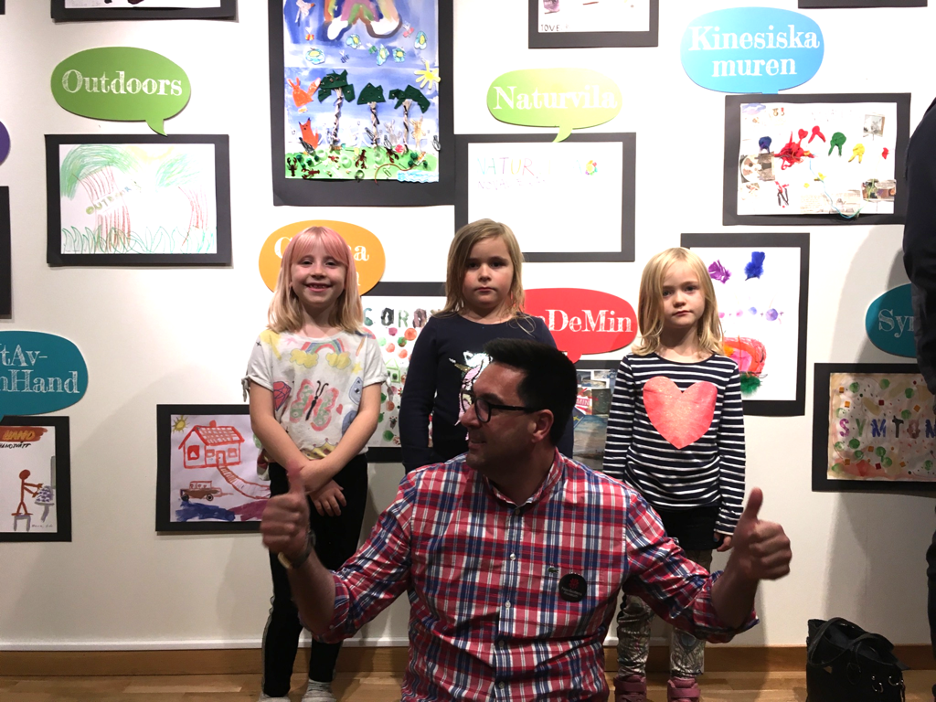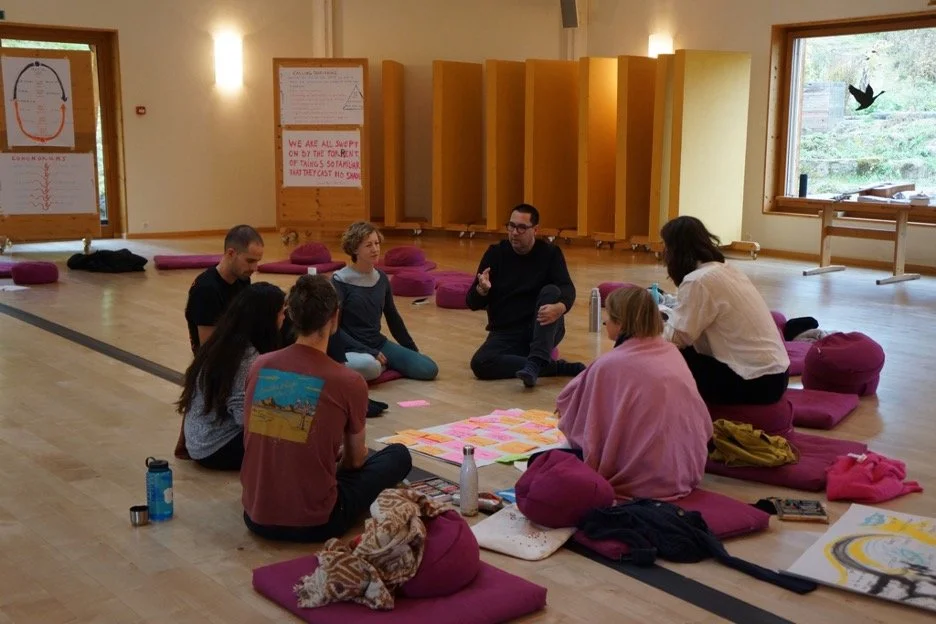Jose Antonio Gordillo Martorell
With over twenty years of experience in education and a passion for the democratization of minoritized and unrepresented cultural voices and cultural heritage, Jose is committed to building both children-centered and nature-centered narratives as strategic tools for organizations. He is a member and advisor of the Diversity and Inclusion Task Force and Climate Action Community Task Force Member in Europeana Foundation, one of the biggest cultural platforms in Europe. He has founded Children’s Boards in various museums around the world including Norrbottens Museums (Sweden), the Swiss National Museum, Museo of Solution ( Mumbai India), The Hunt Museum (Ireland) and Fondation Lascaux (Switzerland). His main work areas are children's participation in democratizing organizations, and so we were eager to learn a little more about his own childhood during a recent conversation!
Jose, we’re so happy that you agreed to join us in this short chat about your life and work!
Perhaps you can start off by telling us a little about where you come from?
I like to say that I am from the place where I am at the moment. At the moment I am based in Zürich, Switzerland, a beautiful country where nature is part of the daily landscape. This is very important because nature sustains me. I really need my daily forest bath!
One of my earliest memories is preserved in a special photo. This is a happy moment that I constantly go to in order to stay well connected with my inner child and to be able to face the daily challenges. It is my inner citadel, the place I retreat to in order to nurture myself. In the picture you see a 4 year-old Jose on his first day at the beach. When I was little I had problems because my nose was bleeding a lot so the doctor recommended to my parents that I should go swimming in the sea because it would help me. The problem was that I was a bit afraid of the waves so my grandparents gave me a beautiful blue boat with a beautiful anchor on the deck so I could swim without being scared.
They put sea water in it so I could be calm. So in the photograph I am healing but I am also enjoying a splendid day of sunshine and a gentle sea breeze. I am exploring the world - as I do now - with curiosity, confidence and openness to its immense beauty. I am discovering textures through touch: the sand, the roundness of the cube, the colors, the shapes, the shadows. I am playing and that makes me immensely happy. The photograph is a portrait of a happy child who has made that instant eternal.
If you look closely, that moment is actually a mini Montessori classroom set up on the beach on that wonderful summer day that will always be with me because it is part of me. That's why it was so natural for me and so positive to learn in a Montessori center. The transition was completely natural, not at all traumatic compared to what I was doing before. There was total continuity.
Jose, what was your educational experience like during early childhood?
The best thing about that experience was that there was total continuity between what happened outside the classroom and what happened inside it. In other words, I could continue to be who I was and not only that, but also enhance it. And this is wonderful. It is the Latin root of the word ‘Education’ - Ex Ducare - ‘Extract from within’. To pull from what is already inside. To help it emerge. To bring it out. That is what a good educator does with each of his children. Feeling that I was cared for and celebrated for what I was, but at the same time recognising my potential and helping me to discover it for myself in a free and autonomous way. The dynamics of the classroom reproduced every day what I had experienced that day on the beach. I could even create a beach right there with my classmates to learn about the sea, the sun, the people, the sky! The classroom was a magical place where I could create anything with my classmates. Every day was different and special. There came a time when the classroom was my real home.
Is there a person who made a special impact on you during your early years?
My dear teacher, Miss Querubina, made a deep impression on me and has always been a reference for me. She was loving, deeply delicate and sensitive to each one of us. She connected with our emotions and moods with great ease. She knew how to see in us all the potential we carried. She was a master at what Gabriel García Marquez describes as ‘helping us to discover our favorite toy’, our passion or passions, that which excited us and to which we wanted to dedicate all our time, all our lives. In my case, to learn constantly.
Her classes transmitted an enormous feeling of security, of affection, of care, of extreme confidence, of joy for every little great discovery that we made in the group and that we shared with generosity and curiosity. I am immensely grateful for having had Querubina as a teacher and for having made me the Jose I always wanted to be.
This insight into your past experience is very beautiful. Certainly, there are many people who wish that their first days at school could have produced such positive memories. Now…..moving at full speed towards the present! Your work involves a number of diverse undertakings. Can you tell us about your current position, and some of the projects in which you are involved?
I have been working in museums and cultural organizations for twenty three years in various roles responsible for education, creativity, mediation and strategy. Two years ago I created my own company Cultural Inquiry, which is based in Switzerland but operates globally.
I am involved in different projects aimed at strengthening the presence, active participation and co-creation of children in cultural institutions by enabling them to participate in their decision-making processes. I have created a specific working methodology called ‘Children's Board’ which is being implemented in museums around the world such as the Bern Museum of Communication, the Swiss National Museum or the Museum of Solutions in Mumbai.
In addition to that I am involved in some pilot projects and research in areas such as the relationship of 4 and 5 year-old children with AI as a limiting or enhancing factor for their creativity and self-esteem.
As an author I am preparing a book for the Routledge publishing company about The Children's Board experience and also a fiction book in collaboration with children from Kompass 32 Kindergarten as authors in which they create a story with AI about AI.
Both your interests and your professional life suggest to me that you read a great deal. I’m continually hearing about research that reinforces the fact that early literacy lays the groundwork for later success. Did you enjoy reading as a child, Jose? And, if so, are there any books from your childhood that you remember especially fondly?
I was a precocious child -super gifted they call it nowadays- who started talking and reading very early and who made language a wonderful place where I could take refuge in a toxic family context where I could only count on my mother.
Books were my friends and spoke directly to me, giving me important advice that I applied in my daily life to survive, to overcome the trauma of an abuser. Now I try to imagine something similar for today's children with AI and their AI companions and I work to make it possible. There are books that affected me deeply, such as:
The Little Prince by Antoine de Saint-Exupéry,
The House at Pooh Corner by A.A. Milne,
One Thousand and One Nights
Sandokan by Emilio Salgari,
Orzowei by Alberto Manzi,
The Famous Five by Enid Blyton,
Treasure Island by Robert Louis Stevenson.
They are all part of my emotional baggage from which I have been sustained all my life. Books have made me what I am. And now having written many articles and books and now that I'm writing one for Routledge it's funny that somehow all those books are in all of them. It's a kind of permanent echo that is projected wherever I go and whatever I do. As you can read at the end of The House at Pooh Corner:
“So, they went off together. But wherever they go, and whatever happens to them on the way, in that enchanted place on the top of the Forest, a little boy and his Bear will always be playing.”
There are so many directions to follow up on a conversation like this! You can click on the following links in order to pursue a variety of topics:
Jose’s LinkedIn, Catalyst Lab, and Medium.
Jose’s company, Cultural Inquiry
Our sincere thanks to Jose for this opportunity to reflect on his life, and how he hopes to make an impact on the lives of young people around the world. Phonetic Planet wishes him success in his many exciting projects!




